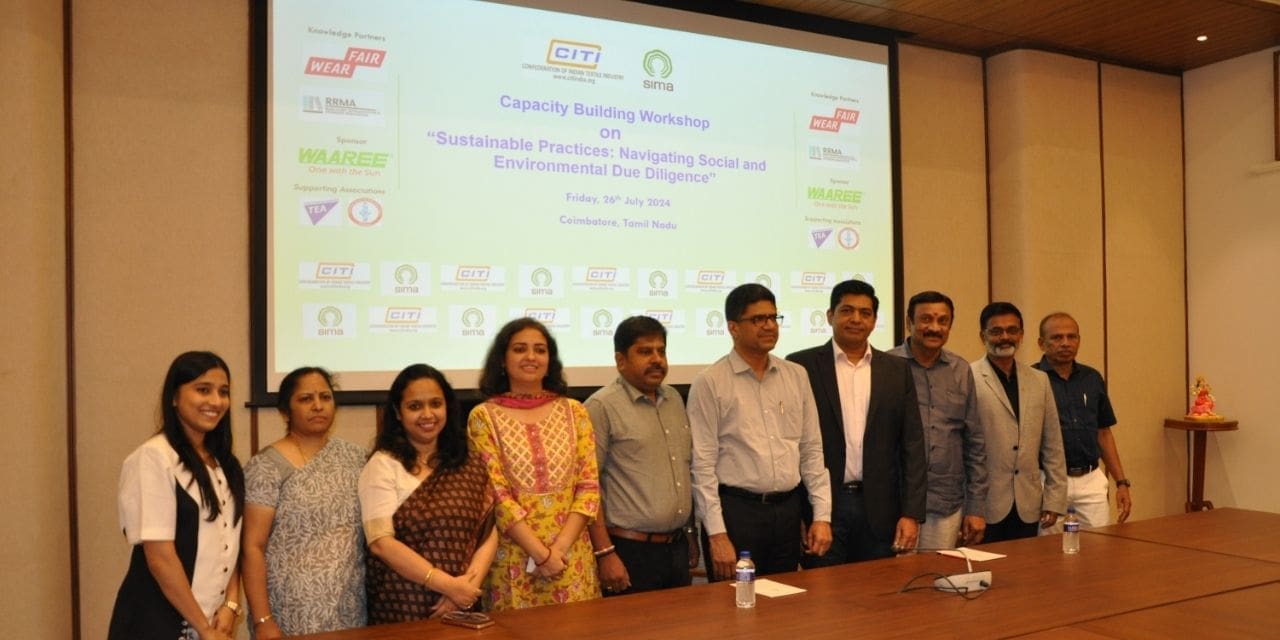Through a formal Memorandum of Understanding, the Confederation of Indian Textile Industry (CITI) and the Fair Wear Foundation have partnered to conduct a comprehensive one-year program aimed at enhancing the capacity of Indian textile exporters to comprehend the upcoming EU due diligence frameworks and to strengthen the voices of suppliers in the consultations. The Corporate Sustainability Due Diligence Directive (CSDDD), which went into effect in May 2024, requires European businesses to conduct thorough environmental and human rights due diligence throughout their global supplier chains.
By creating a uniform legal framework across the EU, this regulation is anticipated to lessen the variety of reporting requirements while promoting equality of opportunity and legal clarity. Indian manufacturers now have the chance to implement environmental and human rights due diligence (HRDD) procedures, which will increase their bargaining power and provide them a better awareness of their potential and dangers.
Former CITI chairman Sh. T. Rajkumar said, “The CSDDD is a transformative development for the Indian textile and apparel sector.” “By embracing this directive, our industry can not only meet global standards but also leverage shared responsibilities with brands, engage meaningfully with stakeholders, and address power imbalances.”
In keeping with this cooperative endeavor, on July 26, 2024 in Coimbatore, the Fair Wear Foundation and CITI collaborated to host a capacity-building workshop entitled “Sustainable Practices: Navigating Social and Environmental Compliances” in partnership with SIMA.
The Regulatory Representatives & Managers Association (RRMA) and the Fair Wear Foundation, two knowledge partners, shared their perspectives during the event and emphasized the significance of chemical compliance in the textile value chain.
Participants received instruction on social due diligence, including the CSDDD’s effects on brands, an overview of their environmental and due diligence responsibilities, and a description of the strategy the directive specifies for combating climate change. Important talks covered topics such as business partner responsibilities, government monitoring and punishments, brand responsibility, and incorporating due diligence into corporate policy.
The global regulatory framework for chemical management in different nations has been discussed by RRMA, with an emphasis on how crucial it is to follow laws in order to safeguard the environment and public health. It covered particular rules, accountable authorities, compliance requirements, the circular economy’s tenets, and sustainable chemical management techniques. There were insights given.
examines chemical compliance in the textile industry, with an emphasis on worldwide regulatory framework, certifications for sustainability, classification of hazardous chemicals, and regulatory standards. It draws attention to how important certifications like GOTS, OEKO-TEX®❏, ZDHC, Blue Sign, Cradle to Cradle, and Eco Label are for encouraging eco-friendly practices in the textile sector.
In his welcome speech, SIMA Chairman Dr. S.K. Sundararaman noted that the legislative changes present possibilities to enhance the power dynamics between brands and suppliers and to show our commitment to sustainability and moral business conduct. According to what he said, SIMA established a “Sustainability Cell” to help the mills in this region of the nation comply with social and environmental regulations. This cell brings in specialists in the field to periodically advise the members on advances. He said that by interacting with the internal committee established by the members as a “External Member,” SIMA is assisting its members in adhering to the guidelines set forth by the Prevention of Sexual Harassment (POSH) Act. As a proactive measure, SIMA published a Code of Conduct for Women titled “Recruitment Guidelines and Code of Discipline for Women Employment in Textile Industry,”
which is specifically intended to help employers comply with labor laws. The purpose of the code is to improve the working conditions for women employees and prevent their exploitation. In addition to publishing a code, SIMA signed a memorandum of understanding (MoU) with M/s. TUV Rheinland, an independent international certifying agency, to inspect textile mills and issue star rating certificates in accordance with their compliance. Additionally, SIMA and BSI signed an agreement for a compliance audit. In order to help its members meet the buyer’s standards, SIMA also created version 2.0 of the Code of Conduct, which covers statutory compliance, environmental, health, and safety standards, recruitment guidelines, and a code of conduct for hiring migrant workers, women, and contract labor in the textile industry.

